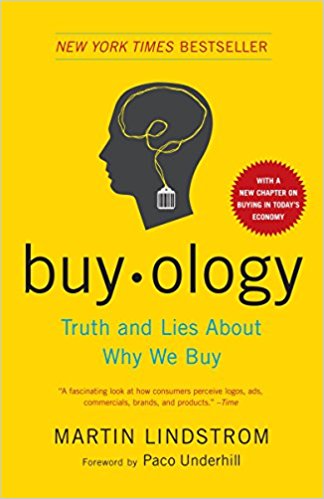Buyology Summary – Martin Lindstrom
5 min read ⌚
 Truth and Lies About Why We Buy
Truth and Lies About Why We Buy
It’s easier if we live in a lie, right? – Well, apparently the advertising world, stimulated by profits, got the idea of how to control the outcome of their campaigns.
On top of that, neuromarketing grants them all the necessary tools to minimize possible failure!
We put in a nutshell: what Martin Lindstrom discovered, and how that affects the business world.
Who Should Read “Buyology”? And Why?
You won’t regret if you put this book on your bookshelf. Why? – Because, unlike other classics, which relate to a certain audience, “Buyology” has received critical acclaim for its in-depth research.
In other words, we believe that is very well suited for all people, and thus answers the cry for help of everyone.
About Martin Lindstrom
 Martin Lindstrom is an author, marketer, keynote speaker and columnist for TIME Magazine, and Harvard Business Review.
Martin Lindstrom is an author, marketer, keynote speaker and columnist for TIME Magazine, and Harvard Business Review.
He is highly skilled in consumer behavior, and what brands should do to maximize their ROI (Return on Investment).
“Buyology PDF Summary”
Buyology by Martin Lindstrom was designed to change the course of the sales funnel, which is affected by the buying decision-making. Martin and his team of experts realized that by utilizing fMRI and EEG technologies, you could read the minds of the customers and see how they react to specific changes.
This brand-building strategy incites the marketers to anticipate the next move of their target group, and dig deep into discovering what’s holding them down before making a purchase.
In other words, Lindstrom dropped a research bomb, in which he collected a massive amount of neuromarketing data. They discovered something extraordinary, a real breakthrough in terms of sales, which seemed too good to be true.
Another thing worth mentioning is Martin’s way of transforming facts into stories, to make them look and feel more absorbable.
The main lessons were extracted from the research in 2004, and the expenditure for compiling such enormous amount of information reached up to astonishing $7 million.
Neuromarketing was a neglected term, a concept that was never under surveillance. If you are still not sure what this case-study was all about, let’s solve this puzzle.
The main idea was to discover how the brain reacts and does it responds to a different marketing stimulus.
Are those incentives strong enough for the customer to change directions? – The body language, the premonitions of doing something useful, subconscious thoughts, all fall in the same category.
Indeed, we are inclined to agree, that escaping from the endless cycle of decision-making is a fictional conclusion.
Something controls our behavior, and it’s in our interest to find out more. Are we leaning to one concept or the other? Do we rely on intuition, or the inner voice, before we put the product in the bag?
A humoristic commercial that extols the benefits of a specific product or service can change the mindset of the people on the other side of the tv-set. For instance, do you know that cigarette ads make people addicted to them even more?
It was Martin’s job to find the core of such mentality, and it may seem a little unorthodox, but that’s how it is. Many groups, already addressed the Congress to stop neuromarketing, because it’s unethical method for increasing sales, at the expense of the well-being of people.
But to be honest, I didn’t share these ethical concerns.
They indicated that commercial benefit, is not at the center of human development, and as such must be restricted and controlled.
When we brand things, our brains perceive them as more special and valuable than they actually are.
In each chapter, you’ll find different facets of neuromarketing, its impact and the power radiating from utilizing such channel. In simple terms. It forces potential buyers into making split-second decisions and thereby guides them through the sales funnel.
Let’s look at it this way: If you participate in a survey commissioned by a credible organization, you must give some answers.
When it comes to a certain commodity; let’s say that you express strong negative feelings about it, and what this does is triggers a different spell of marketing.
The leading individuals behind this survey understand that you bear a grudge against that specific concept, but according to neuromarketing that doesn’t quite reflect your aversion.
You might want to provide a quick checkup of your stimulus and investigate whether your brain is prone to react. In plain English: when you sent negative brain signals, the producers take this as a sign that you share a hidden interest in the topic.
There are other factors such as religious beliefs, superstition, sexual orientation that also determine your position regarding neuromarketing.
Lindstrom comes to a conclusion that using neuromarketing to full extent will drastically improve your odds of success when launching a new product or service. Once the market gives its thumbs up, then you ought to focus on market positioning, and building awareness.
As you can see, plunging into the depths of neuromarketing can give your company the advantage to understand the market, and provide a solution to its problems.
Lindstrom tries to engage the audience and minimizes the complex terminology to make it more easily readable.
Key Lessons from “Buyology”
1. Be persuasive but realistic
2. Find your breaking point
3. New times, new measures
Be persuasive but realistic
People are misguided by the “stories” made up about sales-people, which are also labeled as intruders.
Indeed, almost all businesses put a lot of emphasis on sales, and if yours is no different, perhaps you would like to outline the product’s benefits, not what is in it for you.
Find your breaking point
Have you ever investigated your Buyology? – Are you interested in finding what triggers a “buying” mentality?
It’s necessary to ponder on the stimulus which can change your perception and mindset. That way, you’ll no longer be at the bottom of the system.
New times, new measures
The traditional market research techniques are losing its grip, and a full-scale change in strategy must be set in motion.
Creating focus groups and conducting surveys is no longer an efficient approach to foresee a possible rejection from the business community.
Like this summary? We’d Like to invite you to download our free 12 min app, for more amazing summaries and audiobooks.
“Buyology Quotes”
Sex doesn't sell anything other than itself. Share on X 90 percent of all Gillette shavers are bought by women for the men in their lives. Share on X When we read a book, these specialized cells respond as if we are actually doing what the book character is doing. Share on X Fear, in my experience, spreads faster than anything else - and the ads for those drugs have done a very nice job scaring the pants off us. Share on XOur Critical Review
All the persons who have read this book, are gravitating towards a new outlook of the whole situation, and we are no different.
Staying abreast of mind-blowing discoveries is the only method for staying on top.
Buyology gives you precisely that!!
Emir is the Head of Marketing at 12min. In his spare time, he loves to meditate and play soccer.


 Truth and Lies About Why We Buy
Truth and Lies About Why We Buy




